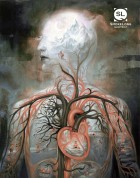The landscape feels very present in this story. In the scene at the end—which wrecks me every time I read it, by the way—the man’s connection to the land feels very strong. Was this something you consciously worked into the story?
First off, thanks for selecting my story! I’m beyond thrilled to be published in SLQ. When I started writing the story, I knew that I wanted to incorporate the surrounding landscape because it’s something that the characters—a farming family who’s anticipating a storm—would be acutely aware of during the drive. Also, I feel like the father, whose own father is dying, would be particularly sensitive to the bleak, winter landscape. On a personal level, I’ve always lived in densely populated, urban areas, so I’m particularly grateful when I have a chance to visit (and write) about open spaces and unfamiliar landscapes.
You’re an attorney by profession, and you said you’ve only recently begun writing short fiction. Leaving aside how astonishing that is, given how accomplished and downright beautiful this story is, can you tell us something about your writing journey up to this point?
I’ve always loved to read—ever since picking up the first Goosebumps (Welcome to Dead House, in case you were wondering)—which I think is the first step in any writing journey. I took a creative writing class in college, which I enjoyed, but wasn’t too successful (I got a “B” and the professor called my final story “haphazard”). I believe that law school and practicing as an attorney really improved my writing. The law requires me to be precise, to value words, to think critically, to consider the opposing side, to develop creative arguments—all skills that help me write fiction.
About a year and a half ago—after I had just read a bunch of short story collections, including, in my humble opinion, one of the best collections of all, George Saunders’s Tenth of December—I decided to try to write my own short stories, and the results were disastrous, to put it mildly. I had no idea what I was doing, and I kept getting rejected. But I kept writing and started working with an editor (Joe Ponepinto, who’s amazing, by the way), and I kept writing and kept getting rejected, but slowly, through Joe’s feedback, I improved.
What are your thoughts/hopes/beliefs about what happens to “patterns of information in the brain” after death?
I take the scientific view: Consciousness does not survive death, and patterns of information in the brain are lost and irretrievable. Uplifting, right?
Your writing style in this story is very natural and unadorned, and incredibly affecting for it. Who are your influences? If we crowd-funded a year at author college for you under the guidance of one writer, dead or alive, who would you choose?
I would choose George Saunders, hands down, to be my teacher at author college. I’m in awe of his writing for so many reasons: his unique and simple prose; his convincing portrayal of absurd characters who are flawed but worthy of redemption; his ability to create layers of emotion—stories that on the surface are funny and on a deeper level are terribly sad but also have a touch of hope. I think, in fact, that the writing style in a Saunders’s story, Addams, influenced my writing style in this story. Plus, I met him at a book signing once and he was really nice.
What are you working on at the moment, in terms of writing? Is there a specific direction in which you’d like to take your work—are you hooked on flash, now that you’ve started, or do you have a novel trilogy sketched out in a drawer somewhere?
I just moved from DC to New Jersey, changed jobs, and have a nine-month-old daughter, so it’s been difficult to find time to write, and honestly, I haven’t given too much thought to the direction of my writing. As a new writer, though, I want to continue to improve, to learn from my mistakes, to take risks, and to seek feedback. I think that for now I’ll be sticking with flash and short fiction because I believe that’s the best way to learn, and I like being able to obsess over each word in a story, which is not something that I’d be able to do with a novel.



 The core workshop of SmokeLong Fitness is all in writing, so you can take part from anywhere at anytime. We are excited about creating a supportive, consistent and structured environment for flash writers to work on their craft in a community. We are thrilled and proud to say that our workshop participants have won, placed, or been listed in every major flash competition. Community works.
The core workshop of SmokeLong Fitness is all in writing, so you can take part from anywhere at anytime. We are excited about creating a supportive, consistent and structured environment for flash writers to work on their craft in a community. We are thrilled and proud to say that our workshop participants have won, placed, or been listed in every major flash competition. Community works.